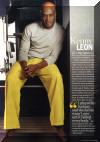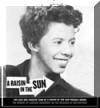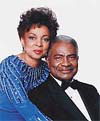|
| |
::EXCLUSIVE INTERVIEW::
December 21, 2006
|
| |
Interview with Kenny Leon
Kenny Leon
is a highly acclaimed director, producer and actor whose experience covers the spectrum of television, stage and film.
Prior to founding True Colors Theatre
Company, Kenny served as artistic director of the
Atlanta-based Alliance Theatre Company for over a decade and has
directed nationally at the Oregon Shakespeare Festival,
Milwaukee Repertory Theater, NYSF/Public Theatre, Hartford Stage
Company and the Huntington Theater Company among others. His
mission is to produce a diverse group of plays from various
times, cultures, and perspectives, while preserving the African
American classics. (Excerpted from
True Colors Theatre Company).
experience covers the spectrum of television, stage and film.
Prior to founding True Colors Theatre
Company, Kenny served as artistic director of the
Atlanta-based Alliance Theatre Company for over a decade and has
directed nationally at the Oregon Shakespeare Festival,
Milwaukee Repertory Theater, NYSF/Public Theatre, Hartford Stage
Company and the Huntington Theater Company among others. His
mission is to produce a diverse group of plays from various
times, cultures, and perspectives, while preserving the African
American classics. (Excerpted from
True Colors Theatre Company).
I was thrilled to have the opportunity to interview this veteran
of stage and film, especially because he has an incredibly
humble and spiritual quality. He even invited me on set
where Kenny and cast have been (in Toronto) and recently
completed production of Raisin
in the Sun starring
Sean Combs,
Phylicia Rashad
and Sanaa Lathan, to
name a few, for the special television movie adaptation,
currently scheduled to be shown on the ABC Television Network in
May 2007. film, especially because he has an incredibly
humble and spiritual quality. He even invited me on set
where Kenny and cast have been (in Toronto) and recently
completed production of Raisin
in the Sun starring
Sean Combs,
Phylicia Rashad
and Sanaa Lathan, to
name a few, for the special television movie adaptation,
currently scheduled to be shown on the ABC Television Network in
May 2007.
Raisin in the Sun, for those that donít know, is about an
African-American familyís struggles with poverty, racism, and
inner conflict as they strive for a better way of life and is
based on the play by Lorraine Hansberry.
How did the casting process
differ for the film than for the theatre?
I guess the only
difference is that you can probably spread the net a little wider in film. You can take longer to find the exact person. The
other ingredient, youíre trying to see whatís going to give the
film the most exposure and whatís going to allow you to do the
job. Sometimes for a Broadway play in New York, I might only
need one star or two stars but in film, youíre trying to get the
most you can.
wider in film. You can take longer to find the exact person. The
other ingredient, youíre trying to see whatís going to give the
film the most exposure and whatís going to allow you to do the
job. Sometimes for a Broadway play in New York, I might only
need one star or two stars but in film, youíre trying to get the
most you can.
Theatre costs less money. Studios have to make money and
theyíre going to spend more money. If you do a Broadway play,
it might be a $2 million project or a musical, thatís $10
million. Sometimes in film, you might have an ideal person but then you
may want to find the ideal person that more people know.
I would say ultimately that the casting process is really
similar. I think that actors cast themselves. You have a
little more involvement from the producers in film. In this
case, Neil and Craig Ė theyíve made so many films and theyíve
done so much. [Craig
Zadan
and Neil Meron,
Executive Producers of the Oscar-Winning Best Picture Chicago,
and Executive-Producers of Raisin.]
How do you direct a relatively new actor like Sean Combs, in one
of the most recognizable roles ever? I understand also that you
played that role opposite Esther Rolle.
Yes, I played that role once and directed Esther Rolle as well.
I had the opportunity of working with Sean on Broadway. I think
heís the best actor in the world to play the part. I put a lot
on me as a director in terms of giving the actor everything he
needs to succeed but I also give a lot of props and credit to
him for being one of the most committed people that Iíve ever
met. He is willing to go the extra mile and is ready to do
whatever it takes to get the job done. Heís a perfectionist and
that goes with my personality because Iím a perfectionist. He
likes the truth and I always give him the truth and he gives me
the truth. Weíre working towards the same thing. He likes
being a part of history which is continuing the legacy of
Lorraine Hansberry Ė itís a great thing.
opportunity of working with Sean on Broadway. I think
heís the best actor in the world to play the part. I put a lot
on me as a director in terms of giving the actor everything he
needs to succeed but I also give a lot of props and credit to
him for being one of the most committed people that Iíve ever
met. He is willing to go the extra mile and is ready to do
whatever it takes to get the job done. Heís a perfectionist and
that goes with my personality because Iím a perfectionist. He
likes the truth and I always give him the truth and he gives me
the truth. Weíre working towards the same thing. He likes
being a part of history which is continuing the legacy of
Lorraine Hansberry Ė itís a great thing.
How do you make this piece accessible to today's movie-going
audience?
Thatís easy. The casting of this project, just like on
Broadway, reaches
 everybody. Weíve got Sean who has a musical
following, he also designs clothes, and he has perfumes. Heís
one of the most recognizable people on the planet. He brings in
that crowd. everybody. Weíve got Sean who has a musical
following, he also designs clothes, and he has perfumes. Heís
one of the most recognizable people on the planet. He brings in
that crowd.
And then you have
Phylicia Rashad
who was
Clair Huxtable on the
Cosby Show. And you have
Sanaa Lathan
who just finished a couple of features. You have
Audra McDonald,
the international music star, you have
Bill Nunn
whose done all of Spike Leeís movies. Weíve added
Sean Patrick Thomas
who did Save the Last Dance and
David Oyelowo
who just did Last King of Scotland. And then
John Stamos
whoís playing
Lindner.
I think that we have a really good cast that is delivering. I
really respect Sidney Poitier. I know Ruby Dee
well and I knew Lloyd Richards before he passed. All the
folks associated with the original Ė they did what they did.
But this particular screenplay is very different than the
original film, itís very different than the original Broadway
play, itís very different than the Broadway play that we
did a couple of years ago. Itís its own thing. Itís more
cinematic, itís beautiful, it moves well. So, when you look at
it, it doesnít feel like anything you know. I donít even think
that people are going to try to compare it. I think there will
be young folk and old folks watching this. I think itís a very
universal story and Iím really proud of what weíve accomplished
in producing the film.
What are the challenges dealing with the transition from stage
to the big screen?
Iím a storyteller. I did Toni Morrisonís opera, Iíve done
musicals, Iíve done dramas. You just have to learn the tools;
you have to learn a little more about the technical aspect of
telling the story because youíre working with the equipment in
film.
But we have a wonderful camera operator, a great script
supervisor, a good DP, a good crew. A lot of folks from Canada
on the crew. What Iím learning is that, just as theatre is
collaborative, making a film is just as collaborative. Probably
even more so because you have more people involved. Thereís so
many people doing every little thing.
Iím really fortunate to have a blessed team so when I do my next
film, it will be my main focus. To make sure that I have a team
of people that youíre going to love to be around. Thatís the
first thing. Hiring becomes much more important. You want to be careful about
whoís on the team and make sure that they have your back and
they are interested in making the same film youíre interested in
making.
What first made you fall in love
with theatre?
I donít know the first
thing. I know the part that excites me is the fact that
you can tell peopleís stories on a stage. Itís a chance
for all human beings to sit next to each other, look at a story
and find themselves in it. The power of finding yourself
in a story creates better human beings, a better way of being
with each other and living with each other. Itís almost
therapeutic.
And in theatre, it changes every night. Depending on who went
to the theatre that night and what the makeup of those people
were Ė who had to get a babysitter, whoís on a date, whoís
bringing a granddaughter. All those people being in that one
space at that one time Ė itís spontaneous every night so once
that experience is over, you never get it back.
On the other hand, making a film is beautiful too because itís
forever. On the stage side, itís beautiful in another way
because itís never going to happen like that again. Itís
immediate and itís three-dimensional.
You have won too many awards to mention here but was there one
that stood out to you for which you are most proud of?
I guess the one that comes to mind is I received an award called
the Living Legacy Award and it was given to me by a group of
senior citizens. I loved that and they were calling me a living
legend. It meant a lot because these are people who have lived
life and your contribution to life meant something to them. I
have a lot of respect for elders.
If Lorraine Hansberry saw your production, what do you hope she
would say?
I hope sheís smiling down here now and says, ďYou got it
right.Ē
She was ahead of her time, an intellect, very political, she was
trying to bring people together, provide understanding. I hope
she would say that ďIf I was there today, all the things that
you have done with the story Ė thatís what I would have approved
ofĒ.
What connection do you feel with August Wilson plays as youíve
worked on so many?
August just died last year so not a day goes by that I donítí
think about him and then we have his Broadway show opening in
May in New York, and thatís the last play that he wrote. I feel
a lot of responsibility to deliver that play in New York the way
he would have it. Iím a spiritual person so Iím always thinking
that heís looking down saying ďOK man, donít f**k up the play!Ē

I put August Wilson and Lorraine Hansberry in the same category
of being
fierce soldiers, incredible artists committed to making a
difference in the world. People like August Wilson, he could
have made millions and millions of dollars. He could have said,
ďI donít want to write plays, Iím just going to do filmĒ but he
didnít. He was committed to writing those ten plays and heís
had a huge impact on American life and American theatre.
He has a universal following. I mean I saw
Ma Rainey's Black Bottom
in South Africa. I look at him as a teacher by example.
How important do you see theatre in relation to the world of
entertainment?
I think it could be important to some people but I think it
could have a broader reach. I think it would be great if some
producers would do more important work and less fluff. Iím
always hoping for theatre that gives us sustenance to sustain
us, fuel us as humans. I donít think thereís enough of that. I
think itís more about escaping and I think that theatre is more
than that. Itís a gathering place for us to grow and to bond
and to be better humans.
If you could work with any
artist, living or past, who would they be?

Langston Hughes,
James Baldwin,
Amiri Baraka
Ö because they were committed artists who found a way to make
their artistry and their personal life one. Just like
Ozzie Davis
and
Ruby Dee
Ė they were very careful about
the projects they chose. They didnít do any projects just
because they needed a project. They were living their lives
that their art was talking about.
How would you like to be
remembered?
That he was who he said he
was.
Right then, the phone rang and Kenny was called back to set but
I want to thank him for this opportunity in a very busy
filming schedule to fit in the time with me to facilitate this
interview. I also want to thank
Samuel L. Jackson for
introducing us and to
Elaine Quan of eQuan Entertainment
for introducing me to Mr. Jackson.
|
|
| |
|